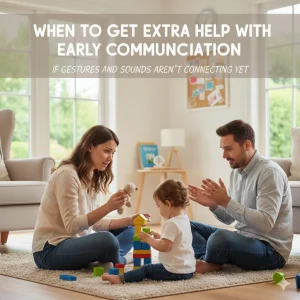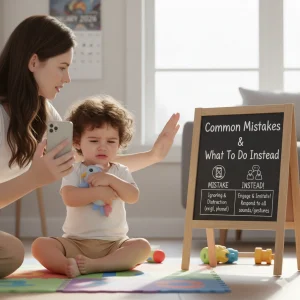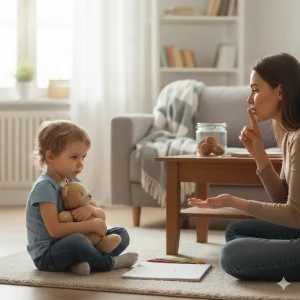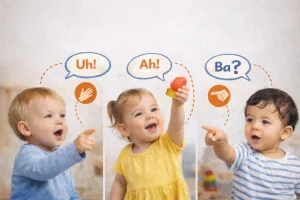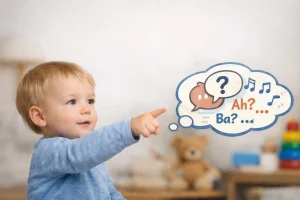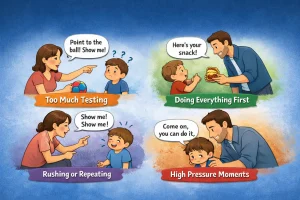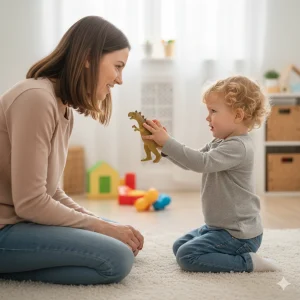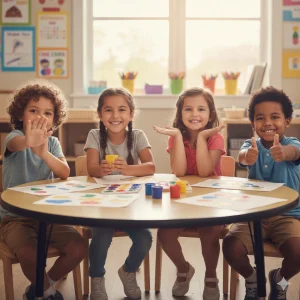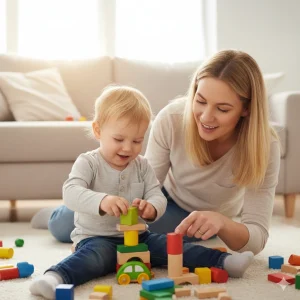Is It Normal for My 3-Year-Old to Repeat Everything They Hear?
Last Updated: August 25, 2025
“Mommy, mommy!”
“Mommy, mommy!” If your 3-year-old repeats everything you say — word for word, tone for tone — you’re not alone. Many parents notice this parroting behavior and start to wonder: Is it just normal mimicry, or could it be something more serious like echolalia or a speech delay? Toddlers are natural imitators, especially as they learn to speak. But when repetition becomes constant or continues beyond expected developmental milestones, it may raise concerns about echolalia in toddlers, autism signs, or speech and language delays.
Free Speech Help for Kids
Concerned about speech delays? Book a free consultation with our expert speech therapist and get guidance tailored to your child’s needs.
What Is Echolalia in Toddlers?
It can be both amusing and puzzling when your toddler echoes every word you say—like a little voice on repeat. But this behavior, known as echolalia, is often a natural part of how young children learn to talk.
Echolalia: A Simple Definition for Parents
Echolalia is when a child repeats words, phrases, or even entire sentences they’ve heard—either right after hearing them or later on. It’s a form of verbal imitation that helps toddlers experiment with language, rhythm, and social interaction.
You might notice your child saying “Want juice?” after you’ve just asked it, or repeating a line from a cartoon they saw hours ago. This parroting behavior in children can seem quirky, but in many cases, it’s part of typical speech development.
Immediate vs. Delayed Echolalia: What’s the Difference?
Not all repetition is the same. There are two types of echolalia parents often see:
- Immediate echolalia: This happens when your child repeats something you’ve just said. For example, if you say, “Time for bed,” and your child instantly echoes, “Time for bed,” they’re engaging in immediate echolalia. This is most common in toddlers learning to process and practice language.
- Delayed echolalia: This occurs when your child repeats phrases they heard hours, days, or even weeks earlier. A child might repeat a line from a favorite cartoon during play, even if it doesn’t seem relevant to the moment. While this can also be typical, especially in imaginative play, persistent or rigid use of delayed echolalia may require closer attention.
Why Echolalia Can Be a Normal Part of Language Development
Here’s what many parents don’t realize: toddler echolalia isn’t always a cause for concern. In fact, it’s often how toddlers practice speaking and learn how conversations work.
Between the ages of 18 months and 3 years, children are absorbing massive amounts of language. Repeating words and phrases is a natural, healthy way for them to:
- Understand word meanings
- Learn sentence structure
- Practice social turn-taking
Most children who use echolalia as a learning tool eventually move on to more original speech as their vocabulary and communication skills grow.
However, if your child is over 3 and consistently relies on repetition without using spontaneous language—or if the repeated phrases don’t seem to serve a clear purpose—it may be worth discussing with a speech-language pathologist.
Is It Normal for a 3-Year-Old to Repeat Everything?
If you’ve been asking yourself, “Is it normal for a 3-year-old to repeat everything they hear?”, you’re not alone. This is one of the most common concerns among parents of toddlers—and it’s a good question.
At age three, children are in the thick of learning how language works. They’re soaking up new words daily, listening closely to the adults around them, and figuring out how to turn thoughts into sentences. It’s completely natural for them to repeat phrases, imitate tones, and echo questions. In fact, it’s one of the ways they learn to speak confidently.
What Speech Looks Like at Age 3: Developmental Benchmarks
By the age of 3, most children can:
- Say short, simple sentences (3–5 words long)
- Ask basic questions like “What’s that?” or “Where go?”
- Name familiar objects
- Be understood by family members most of the time
- Begin to use words to express wants and needs
They may also still repeat parts of conversations, especially when they’re learning new words or trying to participate in adult talk. This repetition is often a natural part of speech development.
When Is Repetition Just Mimicry?
In many cases, a 3-year-old repeating what they hear is just a form of verbal mimicry. Toddlers are little copycats by nature. They repeat what they hear on TV, what their sibling says, or what you say—especially if it’s funny, emotional, or said with a lot of emphasis.
This kind of repetition is usually:
- Contextual – it fits the situation (e.g., repeating “Time to eat” when dinner is served)
- Temporary – it fades as vocabulary grows
- Interactive – it’s part of back-and-forth communication
When Might Repetition Signal a Concern?
While repetition is often harmless, persistent or unusual echoing can sometimes point to underlying challenges—especially if your child:
- Repeats phrases out of context or at random times
- Struggles to generate their own words or original sentences
- Avoids eye contact or has difficulty with social interaction
- Shows little interest in engaging with others through language
In such cases, echolalia may be a sign of a speech delay, a language disorder, or a symptom of autism spectrum disorder (ASD). But remember: not all echolalia is cause for alarm. Some children outgrow it naturally as their language matures.
Key Insight for Parents
So, is it normal for a 3-year-old to repeat everything they hear?
Yes—to a point. It’s normal when it’s used for learning, practicing, and engaging. But if repetition is constant, disconnected from context, or replaces meaningful conversation, it’s a good idea to reach out to a pediatrician or speech-language pathologist for further insight.
When to Worry About Repetitive Speech
It’s easy to brush off your toddler’s repetition as “just a phase.” And in many cases, it is. But as a parent, trusting your instincts matters—especially when that little voice inside you wonders if something more is going on.
So how do you know when it’s time to worry about your toddler’s speech? When does repeating everything they hear stop being a learning tool and start becoming a developmental red flag?
Let’s break it down in a clear and simple way.
Repetition That May Not Be Typical
While repetition is a normal part of early speech development, there are certain patterns that may suggest your child’s communication isn’t progressing as expected. Keep an eye out for:
- Repetition without understanding
If your child repeats phrases over and over, but doesn’t seem to understand what they’re saying or respond meaningfully when asked a question, it could signal a delay in language comprehension. - Loss of context
Your child may echo a sentence like “Do you want juice?” even when there’s no juice in sight. This type of scripting can be a clue that they’re relying on memorized phrases rather than using language to communicate real-time needs. - Lack of original speech
By age 3, most children begin forming their own sentences. If your child is still mostly repeating others instead of coming up with spontaneous words or ideas, that’s worth noting. - Rigid, repetitive speech patterns
Does your child say the same line from a cartoon repeatedly, even when it doesn’t fit the situation? That’s another cue it might be more than mimicry.
Could It Be a Speech Delay or Autism?
When repetitive speech persists—especially when paired with other behaviors—it could be linked to a speech delay in toddlers or signs of autism spectrum disorder (ASD). This doesn’t mean your child is autistic, but it does mean their development may benefit from closer evaluation.
Watch for these additional developmental red flags in a 3-year-old:
- Limited eye contact or social engagement
- Lack of pretend play or shared interests
- Delayed response to name or instructions
- Difficulty expressing needs without repeating others
In many children with autism, echolalia becomes a tool for communication when they haven’t yet learned to form their own responses. It may sound repetitive to us, but for them, it’s a bridge toward building understanding.
What Parents Should Remember
If you’re wondering when to worry about toddler speech, the answer isn’t always clear-cut. But here’s a rule of thumb: if your child’s speech isn’t helping them connect with others, express their needs, or adapt to new situations, it’s worth exploring further.
You don’t have to wait for a formal diagnosis to seek help. A consultation with a speech-language pathologist or developmental pediatrician can provide guidance, peace of mind, and—if needed—a personalized plan to support your child’s growth.
Is Echolalia a Sign of Autism or Speech Delay?
When your child starts repeating words and phrases often, it’s natural to wonder—is repeating speech a sign of autism, or could it be something else, like a simple speech delay?
The short answer? Echolalia—or speech repetition—can occur in both autism and non-autistic language delays. What matters most is how your child uses those repeated words, and what other behaviors accompany them.
Echolalia and Autism Spectrum Disorder (ASD)
Echolalia is one of the more commonly observed behaviors in children with autism. But on its own, it doesn’t mean a child is autistic. In fact, many young children repeat speech as they learn language—this is completely normal in early development.
However, in children with autism, echolalia often shows up in very specific ways:
- Repeating phrases from cartoons, books, or adults without context
- Using memorized scripts instead of forming original responses
- Repeating questions instead of answering them (e.g., you ask, “Do you want juice?” and they reply, “Do you want juice?”)
This type of scripting can act as a coping mechanism. For many children on the autism spectrum, echolalia helps them feel more in control or reduces anxiety during social interaction. But it also reflects underlying difficulties with expressive language and social communication.
When to Consider Other Autism Signs in Toddlers
If echolalia appears alongside other autism signs in toddlers, it may warrant a developmental evaluation. These may include:
- Poor eye contact or trouble looking at people’s faces
- Limited joint attention, such as not pointing to share interest or following your gaze
- Difficulty with pretend play or engaging in back-and-forth interactions
- Repetitive behaviors, fixations, or sensory sensitivities
In this context, echolalia isn’t just a quirky speech habit—it may be a sign that your child is struggling to use language in a flexible, social way.
Can Echolalia Happen Without Autism? Yes.
It’s important to know that echolalia is not exclusive to autism. Many children with speech delays, especially those with developmental language disorder or late talking, also echo words and phrases as they try to process language.
In these cases:
- The child may understand what’s being said but struggles to form responses
- Echolalia may serve as a bridge toward spontaneous speech
- With the right support—especially speech therapy—children often progress to using more original, meaningful language
This is where the difference between speech delay vs autism becomes clearer. In speech delay, the primary challenge is with forming words or structuring sentences, but the child may still engage socially, show interest in others, and use gestures or eye contact meaningfully.
How Can You Tell the Difference?
Understanding whether echolalia is part of typical development, a speech delay, or a possible autism diagnosis isn’t something you need to figure out alone. A licensed speech-language pathologist or developmental pediatrician can assess your child’s overall communication, play skills, and social behavior to give you clarity.
What’s important is not to panic—but also not to dismiss ongoing concerns. Early identification leads to early support, and that can make all the difference in your child’s progress.
What Should I Do If My Child Repeats Everything?
Hearing your child echo your words over and over can raise all sorts of questions—and sometimes, concerns. You may find yourself wondering, “Should I just wait and see?” or “Is it time to get help?” Knowing when to observe and wait versus when to take action is key to supporting your child’s speech journey.
Let’s break it down.
When to Observe and Wait
In many cases, especially in children under 3, repetition is a normal part of language development. If your child:
- Understands what you’re saying most of the time
- Is starting to use some original words or short sentences
- Makes eye contact, points to things, and shows interest in others
- Uses repetition during play or conversation naturally
…it may simply be a phase of language growth, especially if the repetition is meaningful or used to connect with you. In such cases, you can support their progress at home through simple strategies like:
- Talking clearly and slowly
- Using short, repetitive phrases in context
- Reading aloud and labeling everyday actions or objects
- Responding to their repeated phrases with new words to model language
But if your child’s speech seems “stuck” or doesn’t progress over several months, it’s time to look deeper.
When to Consult a Professional
If your 3-year-old continues to repeat everything without developing their own spontaneous language—or if their repetition seems disconnected, constant, or out of context—it may be more than just mimicry.
It’s especially important to seek support if your child shows other signs of delayed speech and language, such as:
- Using mostly echoing instead of original words
- Not responding to questions appropriately
- Difficulty engaging in back-and-forth conversation
- Limited use of gestures or social engagement
In these situations, connecting with a speech-language pathologist can be incredibly helpful. These specialists are trained to:
- Evaluate your child’s communication and play skills
- Differentiate between typical speech delays and more complex conditions like autism
- Design a personalized therapy plan to support your child’s language growth
Sometimes, a developmental pediatrician may also be involved, especially if broader developmental concerns are present.
The Power of Early Intervention
The good news? You don’t have to wait for a formal diagnosis to begin helping your child.
Early intervention is one of the most effective tools for addressing speech and language challenges. The earlier a child receives support, the easier it often is to build strong communication skills that last a lifetime.
Early intervention programs can include:
- Speech therapy sessions tailored to your child’s age and needs
- Parent coaching so you can practice strategies at home
- Play-based techniques to encourage natural language use
- Help navigating developmental services and educational support if needed
And remember—seeking support is not about labeling your child. It’s about empowering them with the tools they need to succeed.
How to Support Your Child at Home
When your child is repeating everything they hear, you might feel unsure about how to respond. Should you correct them? Encourage them? Ignore it?
The truth is—you don’t need to be a therapist to make a big impact. With a few simple strategies, you can gently guide your child toward stronger communication skills while keeping your bond warm and positive.
1. Encourage Expressive Language Through Everyday Talk
The foundation of speech development is expressive language—a child’s ability to use words, gestures, and sounds to share what they want, need, or think. Even if your child is mostly repeating what you say, you can still encourage more original language.
Try these daily habits:
- Narrate your actions: “I’m washing the apples now,” or “Let’s open the door.”
- Offer choices: Instead of asking yes/no questions, say “Do you want juice or milk?”
- Pause and wait: Give your child time to respond, even if it takes a few extra seconds.
- Celebrate attempts: Even if the words aren’t perfect, praise any effort to speak up.
These small adjustments help your child feel heard and gradually move from repetition to expression.
2. Use Joint Attention to Build Social Communication
Joint attention is a key skill that develops early in childhood—it’s when you and your child focus on the same object or activity, like looking at a toy together or sharing a book. It lays the groundwork for social communication and back-and-forth interactions.
To encourage joint attention:
- Get down to your child’s eye level
- Point to and name objects together (“Look! A dog!”)
- Follow their lead in play—if they pick up a car, play along with them
- React with emotion and expression to keep them engaged
This shared focus teaches your child that communication is not just about words—it’s about connecting with others.
3. Practice Simple Language Modeling
Language modeling is one of the most powerful ways to support a child who repeats everything. Instead of correcting or asking your child to “say it right,” model the response you’d want them to use—gently and consistently.
Let’s say your child repeats your question:
You: “Do you want crackers?”
Child: “Do you want crackers?”
You (smiling): “I want crackers, please!”
No pressure, no correction—just modeling the behavior you want to see. Over time, your child may start copying your new phrasing and eventually use it independently.
4. Don’t Push—Guide With Patience
Children learn language best when they feel safe, connected, and understood. Pressuring your child to speak, correcting them too often, or quizzing them repeatedly can make communication feel stressful.
Instead:
- Keep interactions playful and low-stakes
- Focus more on connection than correction
- Use songs, routines, and picture books to naturally build vocabulary
- Be patient with progress—every child develops on their own timeline
Your calm presence is the best environment for growth.
Conclusion:
It’s normal for toddlers to repeat what they hear—it’s how they learn. But if your 3-year-old repeats everything and doesn’t use their own words much, it’s okay to ask questions. Trust your gut. You know your child best. Don’t panic—just stay aware. If you’re unsure whether it’s normal speech development or a sign of speech delay or autism, getting help early can make a big difference.
If you’re concerned about your child’s speech development, talk to a pediatric speech therapist. A quick assessment can bring peace of mind and the right support.
Frequently Asked Questions:
1. Is it normal for my 3-year-old to repeat everything they hear?
Yes, in many cases, this kind of repetition is completely normal. Toddlers often repeat what they hear as a way to learn how words sound and how to use them. This stage is called echolalia, and it can be a part of typical development. But if your child mostly echoes what others say and doesn’t use their own sentences, it might be a sign to look into their speech development more closely.
2. What is echolalia in toddlers?
Echolalia means your child repeats words or phrases they’ve heard from others. This can happen right after hearing something (immediate echolalia) or later on (delayed echolalia). While it’s common in toddlers who are learning to talk, echolalia can sometimes be a sign of speech delay or autism, especially if your child isn’t using their own words or the phrases don’t match the situation.
3. How do I know if my child has a speech delay or autism?
A speech delay usually means your child understands more than they can say. Children with delays might struggle to form words or sentences but still show interest in people, eye contact, and play. On the other hand, if your child also avoids eye contact, doesn’t play with others, or shows repetitive behaviors, these may be signs of autism. It’s best to consult a speech-language pathologist or developmental pediatrician for a full evaluation.
4. When should I worry about my toddler’s speech?
You should consider getting help if:
- Your 3-year-old doesn’t speak in short phrases
- They only repeat what others say
- They don’t seem to understand or follow simple directions
- They’re not interested in talking or interacting
These could be developmental red flags and signs that your child might need extra support.
5. Can toddlers grow out of echolalia?
Yes, many children do grow out of echolalia, especially if it’s part of normal learning. As their vocabulary grows, they begin to use more original speech. However, if your child continues to rely mostly on repetition beyond age 3 or 4, or if the repeated phrases don’t make sense in context, it may be time to explore early intervention options.
6. Is repeating speech always a sign of autism?
No, not always. Lots of toddlers repeat speech—even those without autism. In fact, it’s often part of normal development. However, in children with autism, echolalia tends to last longer and may be paired with other behaviors like avoiding eye contact, not playing with peers, or repeating lines from TV shows in unrelated situations. Look at the whole picture, not just the repetition.
7. Should I stop my child from repeating words?
No, you don’t need to stop them. Repeating words is how some children learn. Instead of saying, “Don’t repeat that,” try language modeling. For example, if your child repeats, “Do you want juice?” after you ask it, you can respond with, “Yes, I want juice, please!” This gives them a helpful example to follow. Encouraging expressive language this way builds real progress.
8. What can I do at home to help my child talk more?
There are many simple ways to support your child’s speech at home:
- Use short, clear sentences
- Talk during daily routines (mealtime, bath, bedtime)
- Offer choices instead of yes/no questions
- Wait and give them time to respond
- Use toys, books, and songs to build vocabulary
These methods support social communication and help your child move beyond repetition.
9. Who can I talk to if I’m worried about my child’s speech?
Start with your pediatrician. They may refer you to a speech-language pathologist who can assess your child’s delayed speech and language. This professional will look at how your child speaks, listens, and uses language to interact with others—and will guide you on what to do next.
10. Why is early intervention important for speech issues?
Early intervention means getting support as soon as you notice a delay. The earlier your child gets help, the better their chances of catching up in speech and communication. It can also improve learning, social skills, and confidence. You don’t have to wait for a diagnosis—just reach out and ask for an assessment if you’re unsure.
About the Author:
Anuradha Karanam
Speech-language pathologist (7+ years of experience)
Anuradha Karanam is a skilled speech-language pathologist with over 6 years of experience. Fluent in Tamil, Telugu, Hindi, and English, she specializes in parent counseling, speech sound disorders, fluency assessment, and speech-language evaluations. Anuradha excels at working with children with developmental disorders, offering creative and effective therapy programs. Currently, at Wellness Hub, she holds a BASLP degree and is registered with the RCI (CRR No A85500). Her patience, ambition, and dedication make her a trusted expert in her field.
Book your Free Consultation Today
Parent/Caregiver Info:
Client’s Details:
* Error Message
